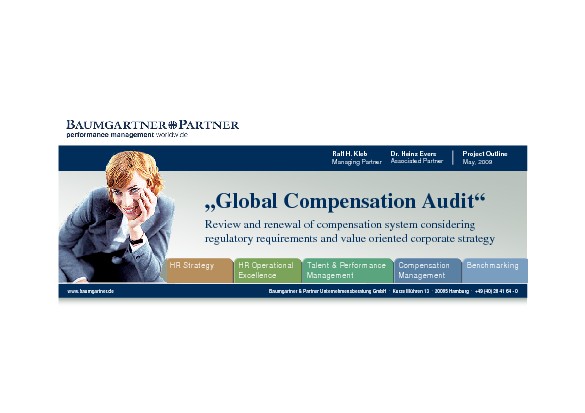Success Compensation
Modern compensation systems rely on the (direct or indirect) distribution of achieved successes – often in the context of a profit-sharing model. Unlike the models for Performance Compensation, these are models which place the focus of compensation structure on measurable and scalable criteria.
Success-Oriented Bonus Systems aim to harmonise the interests of shareholders and managers - also employee targets – via readily comprehensible reference quantities. Success-related compensation systems lend themselves primarily to companies which seek to orient their employees to just a few reference data or do not yet have a marked grading routine.
The selection of just a few parameters makes these systems easily comprehensible. However, this is also an abstraction from reality – which, in unclear circumstances, is a great deal more complex than a mere theoretical model. Therefore, in the course of the application of such models, one must ensure that individual effect correlations are not lost to practical complications.
As a rule, the success of such systems depends on
- how comprehensible and established the quantifiable variables are (i.e., equity-capital yield, profit contribution and ROCI, ROI …),
- the extent of stability applicable to the data over time and
- the (ideally minimal) extent to which these can be influenced by external factors.
Current changes are to be described as follows:
- Due to increasingly shorter market cycles, more and more success-associated models are being supplemented by a medium-term component (with this medium-term orientation, the aim is to absorb cyclic fluctuations and counteract planning difficulties which directly affect incentive structures). In many cases, this means the effect in an annual context instead of a monthly context in the sales division – and in management-level operations, the orientation toward strategic multiple-year targets, regardless of whether the company is a corporation or not.
- Since reference data from internal and external managerial accounting merely reflect past developments, the application of value-oriented approaches such as EVA or the combination of various reference data is on the rise.
Baumgartner & Partner develops in co-operation with you a comprehensible and yield-increasing long-term success-based incentive model. We will assist you in consistently orienting your success-based compensation for employees to the company's own measurable targets – and those associated with its units/divisions.
Interested? We look forward to your message.
Write to: info@baumgartner.de



